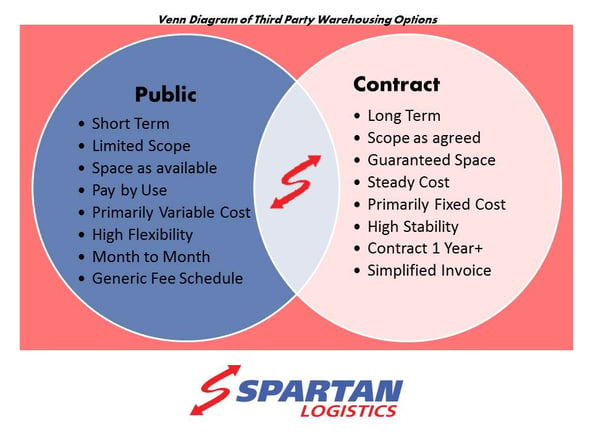In third-party logistics "public warehousing" and "contract warehousing" are common terms. Do you know the difference between them?
This post will touch on the basic differences between contract and public warehousing as referenced by most 3PL service providers. There are some key differences that should be considered when looking to store your product.
To begin with the most basic point: Private Warehousing is an endeavor undertaken by a company, often a manufacturer, to store their own product. The company chooses to absorb all the costs associated and may keep the product on or off-site. Henry Ford is a great example of an innovator who preferred private warehousing. When he expanded the Ford company to begin sourcing his own steel, he had to simultaneously find a place to store it. Ford chose to keep it all under a single company name and expanded Ford Motor Company to handle his warehousing.
On the contrary, 3PL Warehousing is any storage of products by an outside third party. We do not own the product but take on the responsibility of handling the product, keeping track of inventory, investing capital in the equipment, and staffing the operation. As a third-party logistics company, everything Spartan Logistics does falls under this banner. When we meet with clients, however, public warehousing takes on a new meaning.
1. Public Warehousing
Public warehouse space is floor or rack space available for anyone to store anything. Historically, this is usually a pallet-in/pallet-out setup with a monthly square footage rate. Public warehousing in the 3pl world is like an apartment rented on a month-to-month basis. It works well for short-term overflow or seasonal swings in supply and demand.
There is typically not a lot of rework or value-added services provided at this level, although that can be set up. The fee schedule is also straightforward, with the main charges being for receiving and shipping and the square footage the product is in.
Of note, public warehousing is on a first-come, first-served basis. If the warehouse is full, then you will need to find another place to store your product. The flip side of that is increased flexibility. If you are using 10,000 sq ft. this month but plan to have all but 2,000 sq ft. shipped out by April; then you are paying for 10,000 sq ft. this month and only 2,000 sq ft next month.

2. Contract Warehousing
Contract warehousing takes away the flexibility of public warehousing, but you gain a guarantee. Whether the space is full or empty, the square footage you contracted is yours. Spartan Logistics will not fill that space with anyone else's product while waiting to receive your goods.
Contract warehousing is also commonly used to fulfill more intricate customer needs. If there is a need for pallet reworking, a pick-and-pack order fulfillment setup, quality checks, and a large space footprint, a contract warehousing agreement is the way to go. The scope of work needed can be determined and set up within the contract, serving to ensure both client and Spartan meet the requirements.
Most contract warehousing setups are long-term, 3-5 years. This ensures Spartan's investment to fulfill the client's needs whether it be special equipment, trained personnel, or technology solutions, and results in a win-win situation for both parties.
As noted in the Venn diagram above, the invoices are usually very consistent. With contract warehousing, everything is spelled out in the agreement so the monthly or weekly invoices should be fairly similar one to another, leaving no surprises.
Spartan Logistics strives to keep surprises at a minimum. We want to help you grow and meet your goals. Whether you need extra floor space to bring in new materials or you are looking to expand your inventory but have run out of room, we can help. Our team is committed to customer service, respect, teamwork, and integrity because we believe these qualities are necessary to build the relationships that allow all of us to flourish.
Topics: Lessons, Common 3pl Questions, Supply Chain Strategy


